SUMMARY
This is AI generated summarization, which may have errors. For context, always refer to the full article.
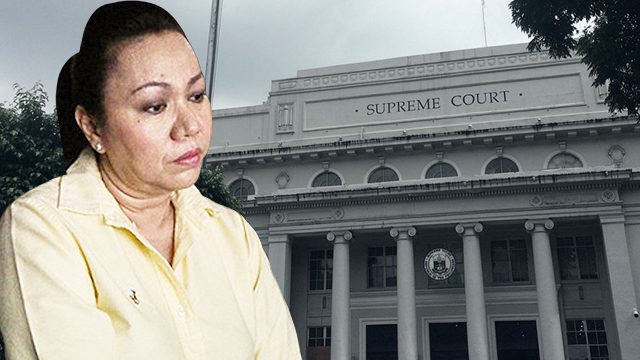
The Supreme Court’s denial of humanitarian bail for plunder convict Janet Napoles coincides with the call of other prisoners for institutional changes to uphold their rights during the pandemic.
In a resolution promulgated last January but released only on Wednesday, June 16, the Supreme Court 2nd Division denied Napoles’ motion, which cited COVID-19 transmission inside prisons and the Enrile doctrine. Former senator Juan Ponce Enrile was granted bail by the Supreme Court in 2015, citing health reasons and his advanced age. This also helped Imelda Marcos get post-conviction bail.
In the case of Napoles, the 2nd Division denied bail mainly because she had already been convicted for plunder, and was not merely a prisoner being detained while on trial.
Calling the controversial Enrile bail “exceptional, if not isolated,” the Court said the bail grant was to make sure Enrile was fit enough to stand trial. Enrile’s plunder trial is stuck at the Sandiganbayan, delayed by numerous pleadings that lengthened the period it remained at the pre-trial stage.
“The Court considered the special and compelling circumstances of the accused who needed continuing medication to preserve their health throughout the criminal proceedings, and to guarantee their appearance in court,” said the resolution penned by Associate Justice Mario Lopez, with concurrences from Chief Justice Alexander Gesmundo, Senior Associate Justice Estela Perlas Bernabe, and Associate Justices Amy Lazaro Javier and Ricardo Rosario.
In this division, only Bernabe was already in the Supreme Court when bail for Enrile was being decided. She dissented.
What about equal protection?
Like the public outrage that resulted from the bail grant to Enrile, a bail grant to Napoles, the pork barrel scam queen, would have likely elicited the same reaction.
As what happened in the Good Conduct Time Allowance (GCTA) fiasco, the release of an “unthinking beast” like the late heinous crime convict Antonio Sanchez was also widely slammed.
As prison reform expert Raymund Narag wrote, “the word heinous is a very emotive term.” It describes a man like Sanchez who was convicted for both murder and rape, yet his crime was lumped together with other heinous crime offenses which may not be as repulsive.
“For example, a person who murdered 5 children after raping them is different from a person who murdered a neighbor over ‘My Way’ when both were drunk. While these are all ‘murder,’ and they deserved to be penalized, they have different levels of monstrosity and perversity. Thus, lumping them together as ‘heinous’ is an amateurish mistake,” Narag said in an earlier Thought Leader piece.
For some, the concept of equal protection would be to not distinguish between or among the crimes at all. This is the argument before the Supreme Court in the pending petition by Bilibid inmates, who are opposing the amendment in the GCTA law that seeks to exclude heinous crimes.
Equal protection was the reason why the GCTA was made retroactive in the first place, to make the law applicable to all.
In recent rulings, the distinction made between prisoners was their status – was the prisoner a convict or a prisoner still on trial? There is wider latitude given to someone still on trial because of the presumption of innocence.
As Bernabe said in her concurring opinion in the case of political prisoners wanting bail during the pandemic, “to let an accused perish in jail because of the deliberate indifference of the State towards his or her medical conditions is even worse than a penalty because he or she has been effectively sentenced to death absent a final determination of his or her guilt.”
Of course there is also the factual issue of whether a prisoner’s health is really in peril. For Napoles, the 2nd Division said her health issues are “a question of fact which is not within the province of this Court to determine.”
That was the reason why Associate Justice Marvic Leonen dissented in the grant of bail to Enrile. He said in his opinion that the Court should not merely rely on a doctor’s certification because “in doing so, we effectively suspend our rules on evidence by doing away with cross-examination and authentication of Dr. Gonzales’ findings on petitioner’s health.”
Whether the Enrile doctrine is good or bad law, “it’s law,” lawyer Kristina Conti earlier told Rappler podcast Law of Duterte Land. Conti was the lawyer for Reina Mae Nasino and 21 other political prisoners in the Supreme Court case.
“I also disagree with the Enrile decision, I thought it was political accommodation. But then it’s law, even if I don’t believe it, it was what the Supreme Court ruled so we abide by it. So now we have to challenge the Supreme Court, you made this law, stick to it for the others,” Conti had said in a mix of English and Filipino.
Right now, prisoner’s rights group Kapatid had called for the release of convicted political prisoner Jesus Alegre, who was in critical condition. It was to no avail because Alegre died days after.
Alegre’s wife Moreta is also a convict, whom Kapatid is requesting a furlough for so she could visit her husband’s wake.
The Department of Justice (DOJ), which supervises the Bureau of Corrections (BuCor), has not yet responded to the request.
Writ of Kalayaan
On prisoners’ rights, Leonen said before: “It’s very dangerous for the court that has found, that has declared that there are rights on the side of the prosecutor and the defense to really go far out of the box.”
But in the political prisoners’ case, Leonen instead proposed a writ of kalayaan, to be able to take into consideration extraordinary circumstances like the pandemic. The writ of kalayaan is an extraordinary remedy that prisoners can avail of when they are able to prove that there is extreme need for reliefs given jail conditions and other health factors.
But it’s still at the research level, said Chief Justice Alexander Gesmundo.
“Writing the rules of procedure takes time because you have to consider a lot of factors before arriving at those or adopting those rules because they have to make sure that we do not deviate from what the Constitution requires,” said Gesmundo in his meet the press event last week.
In the meantime, Napoles stays in jail. – Rappler.com
Add a comment
How does this make you feel?

![[PODCAST] Law of Duterte Land: GCTA’s thorn – Do bad men deserve good things?](https://www.rappler.com/tachyon/2020/09/Law-of-DuterteLand.jpg?fit=449%2C449)
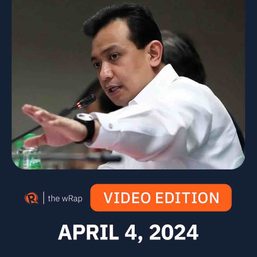
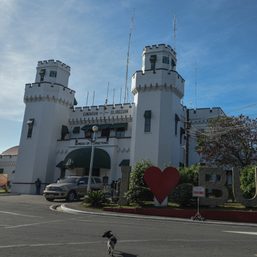
![[OPINION] An urgent appeal to amend the GCTA law](https://www.rappler.com/tachyon/2024/03/An-urgent-appeal-to-amend-the-GCTA-law.jpg?resize=257%2C257&crop_strategy=attention)
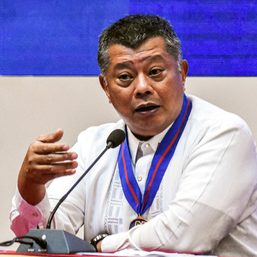
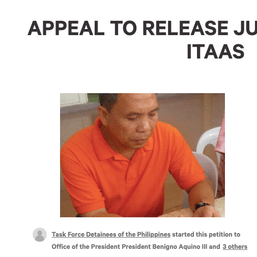


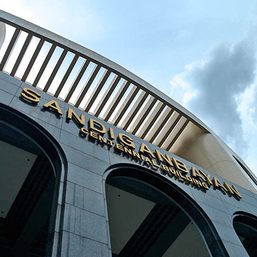
![[OPINION] Jailing Jinggoy](https://www.rappler.com/tachyon/2024/01/tl-jailing-jinggoy.jpg?resize=257%2C257&crop=267px%2C0px%2C720px%2C720px)
There are no comments yet. Add your comment to start the conversation.